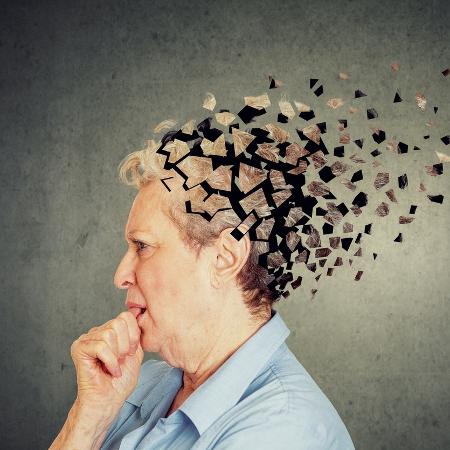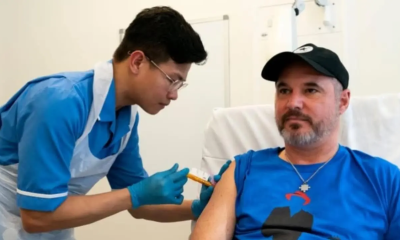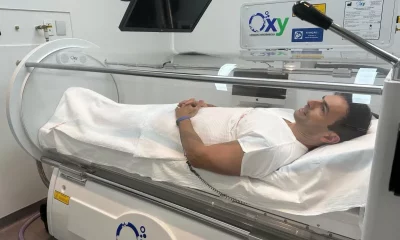
Journalist Fiona Phillips reveals her early Alzheimer’s diagnosis at age 62
Follow Us @
Journalist Fiona Phillips reveals her early Alzheimer’s diagnosis at age 62
Alzheimer’s disease is often considered a condition that only affects older people. However, an estimated 3.9 million people worldwide between the ages of 30 and 64 are living with early-onset Alzheimer’s disease, a form of dementia whose symptoms appear before age 65.
English journalist and broadcaster Fiona Phillips, 62, said she was recently diagnosed with the disease. During the interview, Phillips shared that the main symptoms she experienced before her diagnosis were mental confusion and anxiety. She also highlighted how symptoms can differ between early and late Alzheimer’s disease.
The first symptoms can be confused with other conditions (Photo: Reproduction / iStock)
Commonly, the symptoms begin much earlier, in some rare cases around the age of 30, although the disease is usually diagnosed between 50 and 64 years of age. Some people with early-onset Alzheimer’s disease may also experience heightened anxiety before diagnosis. This may be because they are aware of the changes taking place without a clear reason why they feel different. They may think these behavioral changes are temporary and delay a medical exam. Health professionals may also misinterpret increased nervousness as a symptom of another medical condition.
Research points out that people who have early-onset Alzheimer’s are also more aware of changes in brain activity. This can lead to behavioral changes, with the appearance of conditions such as depression in this group. In the brain itself, early-onset Alzheimer’s leads to chemical changes similar to late-onset Alzheimer’s.
However, the areas of the brain affected by these chemical changes can be different. The research concluded that the areas of the brain involved in processing sensory and motor information (called the parietal cortex) show the greatest signs of damage early on. Compared with late-onset Alzheimer’s, there is also less damage to the hippocampus, an area of gray matter important for learning and memory.
Why is it happening?
Risk factors for early-onset Alzheimer’s disease are similar to late-onset Alzheimer’s disease. For example, low levels of cardiovascular fitness and lower cognitive abilities in early adulthood were associated with an eight-fold increased risk of developing early-onset Alzheimer’s disease. However, we still don’t fully understand all the factors that affect a person’s chances of getting the disease.
One thing experts agree on is that genetics play a role in about one in ten cases of early-onset Alzheimer’s disease. Three genes (APP, PSEN1 and PSEN2) have been associated with the disease so far. All of these genes are associated with a toxic protein thought to contribute to Alzheimer’s disease (known as beta-amyloid).
What can people do?
People who have early-onset Alzheimer’s can be prescribed medicines to help manage their symptoms in the UK. Two therapies have been approved in the United States that can slow the progression of symptoms, but they’ve only been tested in people with late-onset Alzheimer’s, so it’s unclear whether they’ll have an effect there.
People who have a family history of dementia or are concerned about the risk can undergo genetic testing through a private company. This will confirm the presence of genes related to the problem. These tests can be done on people who already have symptoms or on people with a family history who would like to know their future prognosis.
While it’s not possible to modify your genetics if you’re at higher risk, some research supports the idea that you can fortify your brain against disease by adopting a healthier lifestyle. Growing evidence suggests that there may also be a link between traumatic brain injury and early-onset Alzheimer’s disease. In addition to being more active, dietary choices may also reduce your risk of developing Alzheimer’s disease at a young age. An Italian study revealed that people who consumed large amounts of vegetables, dried fruits and chocolate had a lower risk.
Featured photo: The first symptoms can be confused with other conditions. Playback/iStock/Getty Images
Journalist Fiona Phillips reveals her early Alzheimer’s diagnosis at age 62
Follow AFRILATEST on Google News and receive alerts for the main news about celebrities, soap operas, series, entertainment and more!
SHARE POST AND EARN REWARDS:
Join our Audience reward campaign and make money reading articles, shares, likes and comment >> Join reward Program
FIRST TIME REACTIONS:
Be the first to leave us a comment, down the comment section. click allow to follow this topic and get firsthand daily updates.
JOIN US ON OUR SOCIAL MEDIA: << FACEBOOK >> | << WHATSAPP >> | << TELEGRAM >> | << TWITTER >
#Journalist #Fiona #Phillips #reveals #early #Alzheimers #diagnosis #age
-
News2 months ago
Harry decides to appeal after loss of police protection in the UK
-
Good News TV series2 months ago
Preta Gil is the new presenter of TVZ on Multishow
-
Good News TV series2 months ago
Justin Bieber and Hailey go to church using a powerful car
-
Good News TV series2 months ago
Fuzuê: Pascoal is sentenced to more than 70 years in prison
-
Health and Fitness2 months ago
Hyperbaric Oxygenation accelerates recovery from knee injuries, according to USP study
-
News2 months ago
Viradouro wins the Rio de Janeiro Carnival title in 2024 now news
-
Culture2 months ago
the Sub4 Turismo package that we recommend and we go (on the 42 km)
-
Health and Fitness2 months ago
See tips for getting pregnant after age 40











































